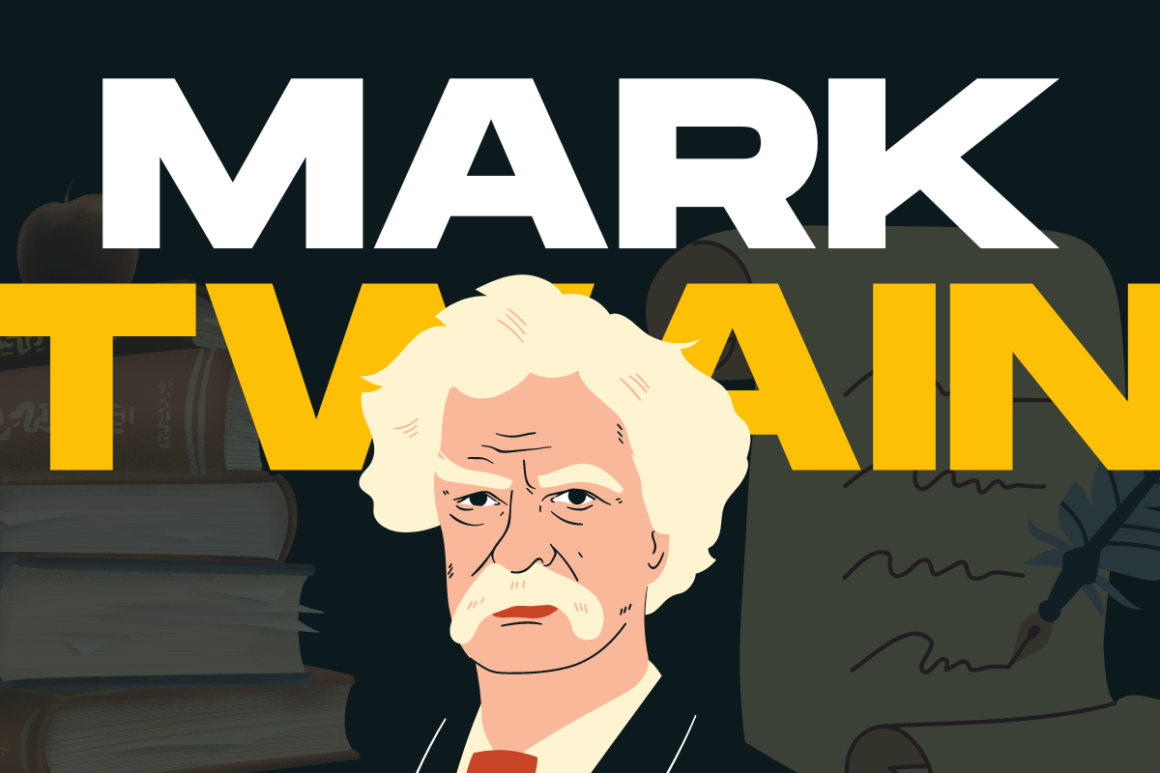Mark Twain, born Samuel Langhorne Clemens, is one of the most celebrated authors in American literature.
Renowned for his wit, humor, and keen observations of human nature, Twain’s works remain influential and beloved by readers around the world.

Early Life
Samuel Langhorne Clemens was born on November 30, 1835, in Florida, Missouri. He was the sixth of seven children born to John Marshall Clemens and Jane Lampton Clemens. When Samuel was four, the family moved to the town of Hannibal, Missouri, located on the banks of the Mississippi River. This town would later serve as the inspiration for the fictional St. Petersburg in some of Twain’s most famous works.
Childhood and Education
Twain’s early years were marked by a love for adventure and a fascination with the river. He spent much of his childhood exploring the banks of the Mississippi and observing the bustling activity of the riverboats. These experiences would later influence his writing, imbuing his stories with a sense of place and authenticity.
Twain’s formal education was sporadic. After his father’s death in 1847, he left school at the age of 11 to work as an apprentice printer. This early departure from formal schooling did not hinder his education, however. Twain was an avid reader, and his job as a printer’s apprentice allowed him access to a wide range of literature, which he devoured eagerly.
Early Career
In 1851, Twain began working as a typesetter and contributor for the Hannibal Journal, a newspaper owned by his brother Orion. This experience provided him with his first taste of journalism and writing for a public audience. At 18, Twain left Hannibal to work as a printer in cities such as St. Louis, New York, and Philadelphia, where he continued to hone his craft.
Riverboat Pilot
In 1857, Twain fulfilled a long-held dream by becoming a riverboat pilot on the Mississippi River. He spent the next two years navigating the river, an experience that provided him with a deep understanding of its culture and rhythms. The pseudonym “Mark Twain” comes from a term used by riverboat pilots to indicate a depth of two fathoms (12 feet), which was considered safe water for navigation.
The Civil War and Mining Adventures
The outbreak of the Civil War in 1861 brought an end to Twain’s career as a riverboat pilot. He briefly joined a Confederate militia unit but soon decided that the military life was not for him. In search of new opportunities, Twain followed his brother Orion to Nevada, where he tried his hand at silver mining. Although his mining ventures were largely unsuccessful, they provided ample material for his later writing.
Literary Career
Twain’s transition from miner to writer began in earnest in 1862 when he accepted a job as a reporter for the Virginia City Territorial Enterprise. It was during this time that he adopted the pen name “Mark Twain.” His humorous and satirical articles quickly gained popularity, establishing him as a distinctive voice in American journalism.
Breakthrough Success
Twain’s first major literary success came with the publication of “The Celebrated Jumping Frog of Calaveras County” in 1865. This short story, based on a tale he had heard during his mining days, was widely acclaimed for its wit and humor. Encouraged by this success, Twain began to pursue a full-time writing career.
Major Works
Over the next few decades, Twain produced a series of novels that would secure his place in literary history. Some of his most notable works include:
- The Adventures of Tom Sawyer (1876): This novel, inspired by Twain’s own boyhood adventures, follows the mischievous Tom Sawyer as he navigates the challenges and joys of childhood in a small Mississippi River town.
- The Prince and the Pauper (1881): A historical novel that tells the story of two boys, one a prince and the other a pauper, who switch places and experience life from each other’s perspective.
- The Adventures of Huckleberry Finn (1884): Often considered Twain’s masterpiece, this novel explores themes of race, friendship, and freedom through the eyes of Huck Finn as he travels down the Mississippi River with the runaway slave Jim.
- A Connecticut Yankee in King Arthur’s Court (1889): A satirical novel that tells the story of a 19th-century American who is transported back in time to King Arthur’s court, where he uses his knowledge of modern technology to become a powerful figure.
Lectures and Travels
In addition to his writing, Twain was also a popular lecturer and speaker. His lectures, characterized by their humor and wit, drew large audiences both in the United States and abroad. Twain’s extensive travels provided him with material for several travel books, including “The Innocents Abroad” (1869) and “Following the Equator” (1897).
Personal Life
In 1870, Twain married Olivia Langdon, the daughter of a wealthy New York coal merchant. The couple had four children: Langdon, Susy, Clara, and Jean. Despite the family’s financial stability, Twain experienced significant financial difficulties later in life due to poor investments and business ventures.
Financial Troubles
Twain’s financial troubles began in the 1880s when he invested heavily in the Paige typesetting machine, a mechanical typesetter that ultimately proved to be a commercial failure. To pay off his debts, Twain embarked on an extensive lecture tour, which took him to Europe, Africa, and Asia. Despite the challenges, Twain’s lectures were well-received, and he eventually regained financial stability.
Later Years and Legacy
Twain’s later years were marked by personal tragedy. His daughter Susy died of meningitis in 1896, followed by the death of his wife Olivia in 1904 and his youngest daughter Jean in 1909. Despite these losses, Twain continued to write and lecture, producing some of his most introspective and reflective works during this period.
Mark Twain died on April 21, 1910, in Redding, Connecticut. His death marked the end of an era, but his legacy as one of America’s greatest writers endures. Twain’s works continue to be read and celebrated for their humor, insight, and timeless appeal.
Mark Twain’s life was a rich tapestry of adventure, humor, and literary achievement.
From his early days as a riverboat pilot to his later years as a celebrated author and lecturer, Twain’s experiences shaped his writing and left an indelible mark on American literature.
His keen observations of human nature, combined with his wit and humor, ensure that his works remain relevant and beloved by readers of all ages.
Mark Twain’s legacy is not only that of a master storyteller but also of a keen social critic and a voice for the American spirit.





